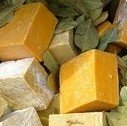Self Reliant
Living and 40 Ways to Self Sufficiency
Self Reliant Living in the Garden
2) Save your own seeds. I save seeds from my open-pollinated vegetables from the previous season and then replant them the following season. I also recycle any vegetables that I may have to buy from the market. This is easily done with spring onions as they usually come with the roots on. Cut them down to about 3 inches, and pot them. They will soon grow into new spring onions for you. Cut the tops when you need them.
Another way for self reliant living and to be self sufficient is to save the seeds from some of these vegetables. I often do this for the fancy red, orange and yellow peppers and some nice tomatoes I may have bought.
3) Learn how to grow herbs. If you live in the city in an apartment you can grow herbs indoors as well. These can be used not just for cooking purposes, but also for herbal teas and homemade herbal remedies.
4) Grow edible flowers for your salads, ice creams, and other dishes and save on food bills.
5) Make your own compost. Think of all those vegetable peelings and fruit skins that go straight to the landfill when you could be turning it into black gold and putting it around your pot plants, using it for repotting, or digging it back into your vegetables.
6) Start a worm farm to enrich your soil and have rich vermicompost freely and cheaply by feeding the worms your kitchen scraps. You may even end up starting a little home based business and earn some money working from home. Fishermen are always looking for live worms, and others are looking for worms to start their own worm farms.
7) Collect the rain water with rain barrels that can be connected to your downpipes so that you can collect rain water from your roof. Use this to water your garden and enjoy some self reliant living by saving on your water bill and reducing your need on water from the local council.
8) Make your own leaf mold by storing leaves over the year in plastic bags and buy a chipper so that you can take all your hard prunings and turn them into perfect garden mulch. Mulching your garden keeps the weeds down, but also helps in water conservation.
9) Make your own liquid manure and liquid fertilizers. Smelly stuff. I mean really smelly stuff, especially if you make it from weeds. But it works!
10) Make your own natural pesticides and insecticides. Make safe organic pesticides to spray on your garden. Safe for you and safe for the good insects and bugs that you need to catch the bad bugs and insects.
11) Add solar panels to your home and sell the excess electricity back to the grid and make a little bit of money out of it. This is self reliant living by living off the grid.
12) Raise some backyard chickens. You can raise bantams if you have a very small space, or you can have full sized chickens. You don't need too many for a steady egg supply. If you get a good chicken breed for eggs a good laying hen will lay about 5 eggs a week. So, if you have 2 chickens you will get 10 eggs a week, or thereabouts, 4 chickens, 20 eggs and so on. Self reliant living at its best with fresh organic eggs every day.
13) Keep a bee hive and raise honey bees. You can do this even if you are living in the city. Check with your local council first, but placing hives on top of apartment roofs are becoming popular and city bees are not uncommon.
Self Reliant Living in the Kitchen
14) Make your own jams, jellies and marmalade. It is not just on homesteads and farms where you end up with a glut of fruit. You will also notice that when you go shopping certain fruits will be readily available and a lot cheaper than usual. This is because these fruits are now in season and there is a glut of them on the marketplace. This is the time to buy these seasonal goods and turn it to your advantage by making homemade jams.15) Preserve your vegetables. It isn't just fruit that we can buy cheaply like this throughout the year, we can also buy vegetables. But then what do we do with them? Well we can look at various ways of food preservation. We can freeze them, pickle them or do some home canning. I remember mum going off to the market and buying huge bags of peas in pods and then sitting in the kitchen taking the peas out so that she could par-boil and then freeze them. Of course, half the fun was eating them at the same time, but boy did they taste great! Don't forget too that sun drying fruit is another way of saving your market harvest and moving towards self reliant living.
16) Make your own homemade bread. There is nothing nicer than the smell of fresh bread coming from the kitchen. It is easier than you think. It is a long process, but can easily be done late at night before you go to bed, or during the day, when you can come back and revisit it to knock the air out of it and prove it again.
17) Make your own homemade wine. You can make wine out of just about anything. You can make wine out of dandelions, beetroot, parsnips, berries, and fruit.
18) Make your own apple cider. If you have an apple tree in the backyard and your kids are sick of eating apples, apple butter and apple pies, then think about making some apple cider for the adults.
19) Make your own beer. Get yourself a beer kit, as this is the simplest way of making beer. As you get better at it, then you can adjust the sugar to get the right alcoholic content.
20) Make your own meals from scratch and stay away from fast foods. This is basic self reliant living. It is cheaper to make your own meals. Buy loose potatoes and make your own chips rather than the frozen chips. Not only are they cheaper, but also healthier in that there will be no preservatives in your own homemade chips. Don't buy TV dinners, take some time in the kitchen to prepare good, wholesome homemade meals.
21) Smoke your own meat products in your own backyard for self reliant living. Learn how to make your own jerky, biltong, sausages and smoked meat and fish through simple ways of homemade smokers and smokehouses. For those of you homesteading you will also be looking at home butchering your livestock at some time, even if it is just killing chickens.
22) Juice your own vegetables and improve your health.
23) Make your own yogurt. Stay away from the commercial stuff. It has lots of preservatives and additives that are just plain nasty. You can easily make your own, including lovely, thick Greek style yogurt and fruit yogurt by adding fruit of your choice.
24) Make your own cheese. Whether it is soft cheese - which is easier to make- or you want to make hard cheese, this is a fun way to be more self sufficient even in an apartment! Who said you had to have lots of land for self reliant living?
25) Make your own homemade ice cream. Quick, easy, delicious!
26) Sprout your own seeds. So easy to do and a great project for the kids.
27) Make your own dog food and pet food. Buying dog food and dog biscuits are expensive if you buy them commercially. So much so that many people are put off having pets because they don't know if they can afford them. Be more self-reliant by making your own homemade dog food and pet food.
Self Reliant Living in the Home
29) Make your own rugs. These can be made using old material for a rag rug, or you can buy canvas and wool and make hook rugs. Lots of fun and a good way to spend the winter.
30) Spin your own wool with local fleece for self reliant living. Spinning is very therapeutic and I love it. There is nothing more satisfying than spinning your own yarn and then learn how to knit your own jerseys or jerseys for the kids and hubby.
31) Make your own patchwork quilts. Patchwork is easy, and there is no need to admire those Amish quilts when you can just as easily make your own.
32) Sew your own clothes. So many have forgotten how to make their own clothes. Children's clothing can be so expensive these days, and considering how quickly they grow, this is a waste of money unless you learn to sew and make cheap clothes for everyone.
33) Learn to crochet. Make a baby's shawl or a table cloth, a warm knee rug... The possibilities are endless.
34) Make your own soap and candles. Making soap is more difficult, especially as you are making soap with lye which is not only potentially dangerous, but it can also end up being a total disaster. However, if you rebatch commercial soap, you can then make soap without lye directly, and still have a homemade soap product by adding your own personal touch with fragrances and additional ingredients like oats etc.
35) Build your own garden furniture, bee hives, porch swings, chicken coops etc. Save yourself some money by engaging in simple DIY projects for self reliant living.
Self Reliant Living in your Personal Life
36) Make your own homemade cosmetics. Let's face it beauty creams, lotions and potions are expensive. But they needn't be if you use simple ingredients found in your kitchen.37) Build your own home! There are kit homes now as well as other ways of home building that are eco friendly and cheaper. What about building a straw bale home? Cheap, effective, warm in winter, cool in summer and definitely eco-friendly.
38) Recycle for green living. Think carefully when you shop. Do you need to buy those bananas in the plastic wrapping or do you go for the ones that have no plastic and will help reduce your carbon footprint. And what do you do with the banana skins afterwards? Do you throw them in the bin or do you cut them up and dig around your roses? Of course you could also add them to your compost bin. And what about your vacuum cleaner dust? Do you throw that into the bin or do you add that to your compost bin too? Because if you don't you are losing out on valuable nutrients for your soil. After your wood fire what happens to your wood ash? It should go into your compost bin. Do you see a pattern here? Recycle where you can and minimize your waste for the landfill.
39) Make your own toys. Kids love toys but they don't have to be expensive. How many times have you seen the kids play with the box rather than what came in the box! Build a tree house, make a kite, make a doll's house out of an old solid suitcase. There are so many ways to entertain kids - and get them out from behind those computer games and into the sun and fresh air!
40) Finally, homeschooling your children is the final tip for self reliant living. I did this with my own 3 children for a while when we lived in Papua New Guinea, and it really was an enjoyable experience.
I am not saying it was easy - it wasn't, especially as they were all in different grades. However, they definitely learned more in the 2 years that I home-schooled them than they could have gleaned from the educational system that was the alternative at the time. Just make sure that when you home-school your children that you also give them plenty of time to socialize with the neighbors' kids so that they don't miss out on social interaction.
Do you have any Advice on Self Reliant Living for Others?
If you have any tips, advice or even a question regarding self reliant living, please write to us here. All you need to do is type and submit. We will do the rest!Leave a Comment
Do you have anything that you would like to add after reading this page? We would love to hear your thoughts. If you can add additional information to what has been written here you will be adding value to the website! No need to have any special skills - just type and submit. We will do the rest!
Other Comments
Click below to see comments from other visitors to this page...
electromagnetic power sources 




I'm not too sure about electromagnetic power sources, but there is someone on the net who seems to have successfully created a solar power system backed …
Additional Thoughts on Self-Reliance 



Being diligent about recycling, composting, and re-purposing you can eliminate your trash bill. I did just that.
I take my own canvas bags to the store. …
Learn to Weld for even a greater degree of self reliance Not rated yet
Learn to Weld
Welding skills allow you to make quick equipment repairs.
Many structural items needed on the farm and in the home can be made by welding …
More on self reliant living Not rated yet
I was raised in the city but summers at my grandmas in the country where we shucked corn, hoed tobacco, learned to love cows and all sorts of animals. …
Free electricity tips? Not rated yet
I want to know more about alternative energy.
Not the typical solar panels or windmills.
But possibly electromagnetic generation.
Thank you.










New! Comments
Do you have something of value to add? Leave me a comment in the box below.